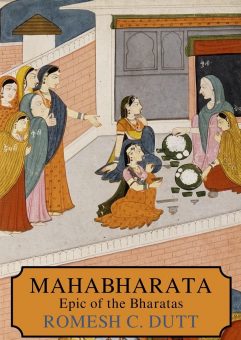On they came, the angry monarchs, armed for cruel vengeful strife,
Drupad midst the holy Brahmans trembling fled for fear of life,
Like wild elephants of jungle rushed the kings upon their foes,
Calm and stately, stalwart Bhima and the gallant Arjun rose!
With a wilder rage the monarchs viewed these brothers cross their path,
Rushed upon the daring warriors for to slay them in their wrath,
Weaponless was noble Bhima, but in strength like lightning’s brand,
Tore a tree with peerless prowess, shook it as a mighty wand!
And the foe-compelling warrior held that mace of living wood,
Strong as Death with deadly weapon, facing all his foes he stood,
Arjun too with godlike valour stood unmoved, his bow in hand,
Side by side the dauntless brothers faced the fierce and fiery band!
VIII. Krishna to the Rescue
Krishna knew the sons of Pandu though in robes of Brahmans dressed,
To his elder, Valadeva, thus his inner thoughts expressed:
“Mark that youth with bow and arrow and with lion’s lordly gait,
He is helmet-wearing Arjun! greatest warrior midst the great,
Mark his mate, with tree uprooted how he meets the suitor band,
Save the tiger-waisted Bhima none can claim such strength of hand!
And the youth with eyes like lotus, he who left the court erewhile,
He is pious-souled Yudhishthir, man without a sin or guile,
And the others by Yudhishthir, Pandu’s twin-born sons are they,
With these sons the righteous Pritha ’scaped where death and danger lay,
For the jealous, fierce Duryodhan darkly schemed their death by fire,
But the righteous sons of Pandu ’scaped his unrelenting ire!”
Krishna rose amidst the monarchs, strove the tumult to appease,
And unto the angry suitors spake in words of righteous peace,
Monarchs bowed to Krishna’s mandate, left Panchala’s festive land,
Arjun took the beauteous princess, gently led her by the hand.
Book III. Rajasuya (The Imperial Sacrifice)
[224] A curious incident followed the bridal of Draupadi. The five sons of Pandu returned with her to the potter’s house, where they were living on alms according to the custom of Brahmans, and the brothers reported to their mother that they had received a great gift on that day. “Enjoy ye the gift in common,’’ replied their mother, not knowing what it was. And as a mother’s mandate cannot be disregarded, Draupadi became the common wife of the five brothers.
The real significance of this strange legend is unknown. The custom of brothers marrying a common wife prevails to this day in Thibet and among the hill-tribes of the Himalayas, but it never prevailed among the Aryan Hindus of India. It is distinctly prohibited in their laws and institutes, and finds no sanction in their literature, ancient or modern. The legend in the Maha-bharata, of brothers marrying a wife in common, stands alone and without a parallel in Hindu traditions and literature.
Judging from the main incidents of the Epic, Draupadi might rather be regarded as the wife of the eldest brother Yudhishthir. Bhima had already mated himself to a female in a forest, by whom he had a son, Ghatotkacha, who distinguished himself in war later on. Arjun too married the sister of Krishna, shortly after Draupadi’s bridal, and had by her a son, Abhimanyu, who was one of the heroes of the war. On the other hand, Yudhishthir took to himself no wife save Draupadi, and she was crowned with Yudhishthir in the Rajasuya or Imperial Sacrifice. Notwithstanding the legend, therefore, Draupadi might be regarded as wedded to Yudhishthir, [225] though won by the skill of Arjun, and this assumption would be in keeping with Hindu customs and laws, ancient and modern.
The jealous Duryodhan heard that his contrivance to kill his cousins at Varanavata had failed. He also heard that they had found a powerful friend in Drupad, and had formed an alliance with him. It was no longer possible to keep them from their rightful inheritance. The Kuru kingdom was accordingly parcelled; Duryodhan retained the eastern and richer portion with its ancient capital Hastina-pura on the Ganges; and the sons of Pandu were given the western portion on the Jumna, which was then a forest and a wilderness. The sons of Pandu cleared the forest and built a new capital Indra-prastha, the supposed ruins of which, near modern Delhi, are still pointed out to the curious traveller.
Yudhishthir the eldest of the five sons of Pandu, and now king of Indra-prastha, resolved to perform the Rajasuya sacrifice, which was a formal assumption of the Imperial title over all the kings of ancient India. His brothers went out with troops in all directions to proclaim his supremacy over all surrounding kings.
Pages: 1 2 3 4 5 6 7 8 9 10 11 12 13 14 15 16 17 18 19 20 21 22 23 24 25 26 27 28 29 30 31 32 33 34 35 36 37 38 39 40 41 42 43 44 45 46 47 48 49 50 51 52 53 54 55 56 57 58 59 60 61 62 63 64 65 66 67 68 69 70 71 72 73 74 75 76 77 78 79 80 81



